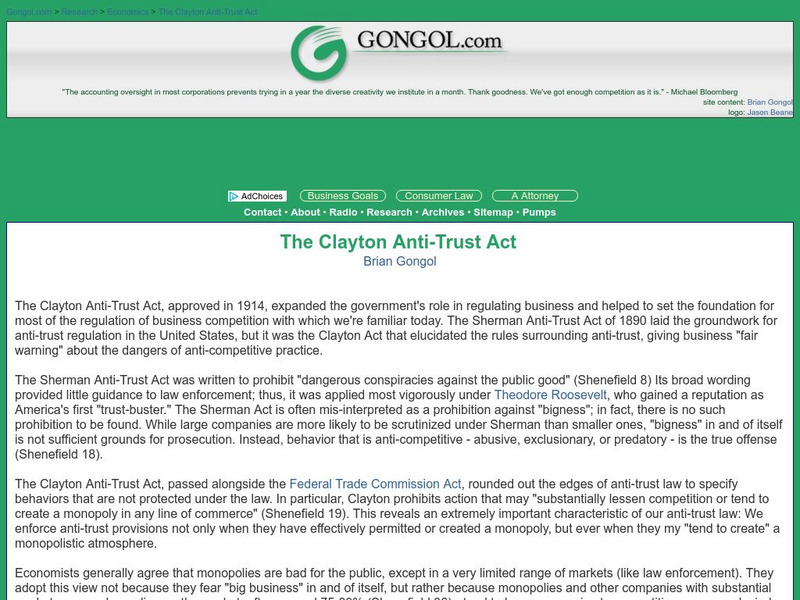Curated OER
Progressives and the Era of Trustbusting
Students investigate the free-market system and anti-trust laws. In this Bill of Rights lesson, students listen to their instructor present a lecture on the details of monopolies and the progressive reform movement to establish...
Curated OER
Being Too Hard on Microsoft?
Students compare the antitrust case against Microsoft with other historic antitrust cases. After exploring the notions of capitalism, monopolies and trusts, students examine the current case against Microsoft.
Curated OER
Chapter 6 and 7 Unit Test
In this Progressive Era and Big Business test worksheet, students respond to 15 matching, 3 multiple choice, and 4 short answer questions.
Curated OER
Is Monopoly the Microsoft Board's Game?
Students first participate in an in-depth discussion about capitalism, monopolies, trusts, mergers, and the Sherman Antitrust Act. They work in groups to investigate past examples of corporations tried for antitrust act violations.
Curated OER
Antitrust Policy & Regulation: CH 32
Pime your economics class with this presentaion on Antitrust policy and law. They review the antitrust laws and discuss how those laws impacted Industrial and Social Regualations. To be used along side McGraw-Hill/Irwin economics text...
Curated OER
Free Enterprise and Monopoly
In this United States history activity, students utilize a word bank of 10 terms or phrases to answer 10 fill in the blank questions pertaining to evolution of the nation's economy to one of free enterprise. A short answer question is...
Curated OER
Radio Free America?
Students explore the controversy over the recent FCC vote to loosen restrictions on media ownership. After researching the background and position of local radio stations, students evaluate and make recommendations about free speech.
Curated OER
The Development of Antitrust Enforcement
Students analyze antitrust enforcement. In this American economics lesson, students listen to their instructor present a lecture regarding the details of the free market system and antitrust laws. Students respond to discussion questions...
Curated OER
Why did the Homestead Strike turn violent?
Fifth graders practice reading skills while looking at different accounts of The Homestead Strike. In this reading skills lesson, 5th graders practice sourcing, close reading, and corroboration through reading a timeline and...
Curated OER
How Can Business Profit from Tariffs? p1
Students investigate the impact of tariffs on businesses and consumers during the 1880s by looking at a political cartoon, solving a short math problem and comparing protectionism in the 1980's to protectionism in the 1880's.
Curated OER
Social Studies Review for Grade 5 (5.1)
In this social studies review for grade 5 (5.1) worksheet, 5th graders answer 25 multiple choice questions in a standardized test format about U.S. history.
Curated OER
How Can Big Business Make Money From Tariffs?
Students explore the concept of the rise of big business in the United States. In this economics lesson, students investigate the impact of tariffs on businesses. Students also investigate the impact that incentives have on special...
Humanities Texas
A President's Vision: Theodore Roosevelt
Through an engaging, interactive experience analyzing primary sources, invite your young historians to take a closer look at the presidency of Theodore Roosevelt.
Curated OER
Theodore Roosevelt
In this online interactive history worksheet, students respond to 10 short answer and essay questions about Theodore Roosevelt. Students may check some of their answers on the interactive worksheet.
Vassar College
Vassar College: 1896: Trusts and Monopolies
As part of a large site dealing with the election of 1896 is this article on Trusts and Monopolies. Although the focus is on the Republicans' anti-trust sentiments in the election, you can read about the rise of big business, monopolies,...
US National Archives
Our Documents: The Sherman Anti Trust Act (1890)
Available on this informative site is an interactive copy of the original Sherman Anti-Trust Act of 1890. You can also view larger images, a typed transcript, and download a .PDF file. Beneath the interactive image is a brief but...
Other
John D. Rockefeller and the Standard Oil Company: The Standard Oil Trust
This site explores how John D. Rockefeller built the first great industrial trust, as well as its subsequent investigations and dissolution.
Other
South Western Learning: Econ News: Policy Debate: Is Microsoft a Monopoly?
This essay provides a debate-style format on whether or not Microsoft is a monopoly. Previous anti-trust cases are cited, both for and against Microsoft's position. Could be used for a classroom debate or opinion essay.
Tutor2u
Tutor2u: Monopoly Price Discrimination
Many examples of price discrimination are provided, along with supporting graphs, and reasons why firms engage in this practice.
University of Groningen
American History: Outlines: The Era of Expansion and Reform
This resource, a speech by Woodrow Wilson to Congress on April 8, 1913, gives a great review of how the United States transformed from from a rural country to an urban one. It includes a review of industrialization, new inventions,...
Digital History
Digital History: The Supreme Court Decides [Pdf]
An explanation of the Supreme Court decision in 1911 that broke up the monopoly of Standard Oil, charged with unreasonable restraint of trade. Read commentary that claimed that the decision did not really increase competition in the oil...
PBS
Pbs: American Experience: Rockefeller on Trial
As part of an American Experience documentary on the Rockefellers, this article describes the investigations and lawsuits against John D. Rockefeller and his Standard Oil Company because of the oil monopoly he formed.
Digital History
Digital History: Empire 'S Challenge to Standard [Pdf]
In the era of big business and business tycoons in the late 19th century, John D. Rockefeller held a very high position. Read about how he thwarted an attempt by two railroad owners to keep Rockefeller from controlling all the oil...
Other
Gongol.com: Clayton Anti Trust Act
Brian Gongol has posted an excellent essay describing and analyzing the Clayton Anti-Trust Act.




















![Digital History: The Supreme Court Decides [Pdf] Website Digital History: The Supreme Court Decides [Pdf] Website](https://static.lp.lexp.cloud/images/attachment_defaults/resource/large/FPO-knovation.png)

